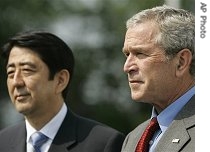-
(单词翻译:双击或拖选)
Rostock, Germany
06 June 2007
Japan and the United States want the world's leading industrialized nations to put more pressure on North Korea to comply with an international agreement aimed at ending its nuclear weapons program. VOA White House Correspondent Scott Stearns reports from Germany, where Japanese Prime Minister Shinzo Abe and U.S. President George Bush met to discuss the matter ahead of the start of the G8 summit.
 |
| U.S. President Bush (r)accompanied by Japanese Prime Minister Shinzo Abe, make remarks after their meeting at the start of the G8 Summit in Heiligendamm, Germany, 06 Jun 2007 |
Mr. Abe said he wants G8 leaders to bring more pressure to bear on Pyongyang to meet its nuclear obligations and resolve the dispute over Japanese civilians1 abducted2 by North Korean agents.
"Unfortunately, the North Koreans have not done anything to implement3 the initial actions," said Mr. Abe. "And also on the issue of abduction, they have not taken any sincere actions to resolve that issue. So we agreed that the G8 leaders need to send a strong message to North Korea on these issues."
President Bush said G8 leaders have a common message that they expect North Korea to honor the nuclear agreement reached with the United States, Russia, China, Japan, and South Korea. The deal supplies fuel oil to North Korea in return for it shutting down its nuclear reactors4 and allowing international inspectors5 to verify the move.
North Korea says it will not close its reactors until it receives $25 million from a North Korean account in a Macau bank that was frozen in 2005 after Washington said the funds were tied to money laundering6.
The Bush administration says it unfroze those funds in March. But because the money is tainted7 by charges of money laundering, some reputable banks in China and America have refused to handle the funds, complicating8 the transfer to North Korea.
Russia's deputy foreign minister says his country will work to help resolve the issue if the United States ensures that sanctions will not be used against Russian banks in the future.
 收听单词发音
收听单词发音
1
civilians

|
|
| 平民,百姓( civilian的名词复数 ); 老百姓 | |
参考例句: |
|
|
|
2
abducted

|
|
| 劫持,诱拐( abduct的过去式和过去分词 ); 使(肢体等)外展 | |
参考例句: |
|
|
|
3
implement

|
|
| n.(pl.)工具,器具;vt.实行,实施,执行 | |
参考例句: |
|
|
|
4
reactors

|
|
| 起反应的人( reactor的名词复数 ); 反应装置; 原子炉; 核反应堆 | |
参考例句: |
|
|
|
5
inspectors

|
|
| n.检查员( inspector的名词复数 );(英国公共汽车或火车上的)查票员;(警察)巡官;检阅官 | |
参考例句: |
|
|
|
6
laundering

|
|
| n.洗涤(衣等),洗烫(衣等);洗(钱)v.洗(衣服等),洗烫(衣服等)( launder的现在分词 );洗(黑钱)(把非法收入改头换面,变为貌似合法的收入) | |
参考例句: |
|
|
|
7
tainted

|
|
| adj.腐坏的;污染的;沾污的;感染的v.使变质( taint的过去式和过去分词 );使污染;败坏;被污染,腐坏,败坏 | |
参考例句: |
|
|
|
8
complicating

|
|
| 使复杂化( complicate的现在分词 ) | |
参考例句: |
|
|
|















